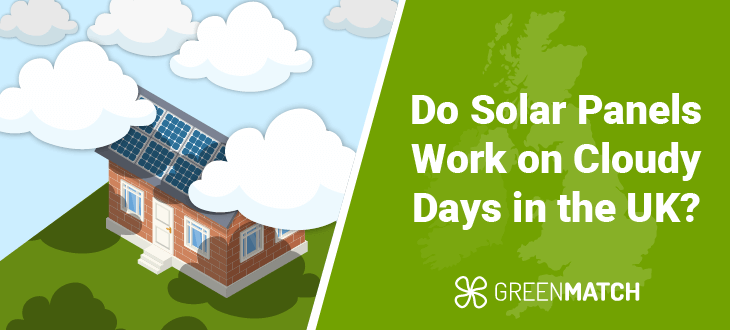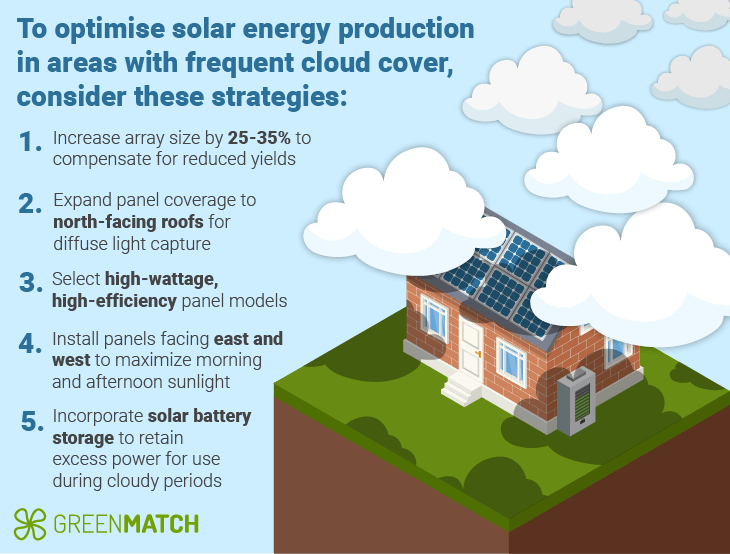Answer these simple questions and we will find you the BEST prices
Which type of solar quotes do you need?
It only takes 30 seconds
100% free with no obligation

Get up to 4 quotes by filling in only 1 quick form

Slash your energy bills by installing solar panels

For the average 2-3 bedroom house
- GreenMatch
- Solar Energy
- Solar Panels
- Cloudy Days
Do Solar Panels Work on Cloudy Days UK? (October 2025)


- Solar panels can work in cloudy weather in the UK, especially with high-efficiency panels and proper installation. Investing in a solar battery system can also help store energy for use during less sunny periods.
- On a cloudy day, solar panels generate 10 to 25% of their normal output, with a difference of around 0.73 GW compared to brighter overcast conditions.
- To maximise solar panel efficiency on cloudy days, ensure proper installation with optimal orientation and angle, invest in high-efficiency panels, and install a solar battery system for energy storage.
One of the most frequently asked questions regarding the installation of solar panels in the UK is whether or not they work on cloudy days, given that the UK is not especially renowned for its good weather conditions. Nevertheless, solar panels are still efficient and are being widely adopted nationwide to achieve the UK government's ambitious net zero by 2050 target.
In this article, we’ll answer all your questions about solar panel efficiency in cloudy weather in the UK, how to maximise solar panel efficiency under these adverse weather patterns, and how to find the most efficient solar panels for your household’s needs.
Finding and comparing reliable solar panel installers in your area can be challenging and take hours of your time when done alone. Here’s where GreenMatch can help. We can connect you with up to 4 solar experts near you for free! Just fill in our 30-second form, and we’ll do the rest.
- Quotes from local engineers
- Payment by finance available
- Save up to £1,567 per year
It only takes 30 seconds



Do solar panels work in cloudy weather?
Solar panels work in cloudy weather in the UK but with reduced efficiency. On cloudy days, they typically produce 10-25% of their normal output.

The impact varies based on cloud thickness and type; thin or partial cloud cover can allow more light through, sometimes even enhancing production through the "edge-of-cloud effect." While clouds decrease solar radiation reaching the panels, they don't completely block it, allowing for continued energy generation even in overcast conditions.
Atmospheric factors, such as aerosols (water vapour, dust, and air pollution), also reduce solar radiation. Seasonally, solar power generation drops significantly in winter to about 50% less of a typical summer day's output due to shorter daylight hours and increased cloud cover.
However, advancements in solar technology, which can be seen in the most efficient solar panels in the UK, can help improve performance in low-light conditions.
Moreover, while cloudy weather reduces solar panel efficiency, modern systems can still generate energy effectively. On overcast days, panels typically produce around 10-25% of their normal output, and strategies like spreading solar plants geographically can enhance grid resilience during such conditions.
How to maximise solar panel efficiency on cloudy days
Once the question of whether solar panels work in cloudy weather is settled, it’s important to consider “How can solar panels be maximised on cloudy days?” The short answer is that this will depend on several factors, such as the type of solar panels, the use of solar batteries to save surplus electricity, solar panel cleaning, and solar panel position.
In the diagram below, we’ve compiled the best tips to maximise solar panel efficiency on a cloudy day:

These adjustments can help maintain consistent energy production despite variable weather conditions, ensuring a more reliable solar power system in cloudy conditions.
Find efficient solar panels for your household
Overall, solar panels can still operate effectively on cloudy days, although the UK's grey weather affects their efficiency. While performance can reach 80-100% on sunny summer days, it typically drops to 10-25% during overcast winter periods.
That being said, proper system sizing and orientation ensure that solar energy remains viable even in cloudy conditions. Rain can also help by cleaning the panels, potentially boosting efficiency. At the same time, by pairing your solar system with solar batteries, you can store surplus energy for later use.
Despite this variability, the advantages of solar panels still make solar energy a compelling choice in the UK. The government's commitment to renewable energy supports this, which is evident in its recent policy changes, including a significant increase in funding for renewable energy initiatives.
These include multiple solar panel grants such as the ECO4 scheme, which provides free panels to low-income households until 2026, while HUG2 offers up to £10,000 for eligible properties until 2025. The Smart Export Guarantee allows owners to earn money from exporting excess energy into the grid. Additionally, the 0% VAT scheme on solar panel purchases runs until March 2027.
Want to go solar but don’t know where to start? We can find you up to 4 free quotes from solar panel experts in your area. Avoid the hassle of spending days on research and comparisons on your own. Fill in our 30-second form, and we’ll do the rest.
- Quotes from local engineers
- Payment by finance available
- Save up to £1,567 per year
It only takes 30 seconds



FAQ
Solar panel efficiency on cloudy days ranges from 10 to 25%, compared to 80 to 100% during a clear sunny day.
Yes, solar panels work even when it’s not sunny, though their efficiency may decrease in cloudy or rainy conditions. Proper system design, orientation, and rain cleaning can help maintain their effectiveness.
Solar panels can work with moonlight, but their efficiency is extremely low, making practical energy production negligible.

Alejandro is a copywriter at GreenMatch and is passionate about European environmental policy and renewable energy. He has conducted research on the European Green Deal’s impact on EU energy policy and climate adaptation, and he is committed to using his writing skills to promote sustainable policies.
We strive to connect our customers with the right product and supplier. Would you like to be part of GreenMatch?

Stay up to date with energy saving tips and grant alerts
Receive offers, marketing and promotions via email from Leads.io about GreenMatch and our brands/partners to help you save.
Thank you for subscribing to our newsletter!
Your email has been successfully added to our list. We look forward to sharing our latest updates with you soon!
